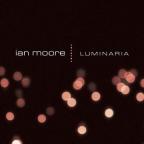Seattle-by-way-of-Austin singer-songwriter Ian Moore has managed to successfully produce and write one of the most quietly beautiful albums of 2004. Moore’s overtly emotional voice channels Jeff Buckley, Townes Van Sandt, and Big Star, while the layers of southern gothic and pure pop bliss he adds assure that he still sounds quite unique. Despite dipping his toes into the waters of 70’s folk, the resulting Luminara is a completely evergreen album, creating an atmosphere where you can sit back, close your eyes and complete forget that it is 2004, or any year for that matter. This album is timeless, which is incredibly rare these days amongst all the newfangled trends that popular music spits out.
Like many independent artists, Ian Moore tours almost constantly. Luminara reflects that, having been recorded over the course of several months — some tracks recorded at friends’ houses, some on the road — yet they all snap together like a well-constructed puzzle or collage. One of my favorite tracks, "Caroline," showcases this puzzle-esque recording process: the song originated at an apartment in San Francisco. Moore began recording while his friends were sleeping (hence the quiet vocals in the beginning); the drum tracks were recorded with Chris Searles in Tucson, Arizona, while Moore was in town for a radio interview. The structure of the song also follows the aforementioned aesthetic, weaving through beautiful, slightly dark melodic folk for most of the song and then breaking out in pure early-Beatles style pop glory. The structure of the album not only showcases Moore's talents, but has a wonderfully schizophrenic quality in that you hear and feel the variety of different musicians' (including Chris Searles and Bukka Allen) influences interwoven with the unique Americana Moore creates.
What is astonishing about Luminara is that Moore is able to capture all aspects of Americana: folk, blues, honky tonk, Appalachian and Southern Gothic. Yet at the same time, because of his versatility as an artist, he transcends genres in a way that reveals his emotional connection to his work. He leaves the listener aware of the feeling of being alone, but not being lonely. From the beginning of the album, Moore creates an atmosphere of bittersweet comfort, combining all aspects of what makes American music stellar.
